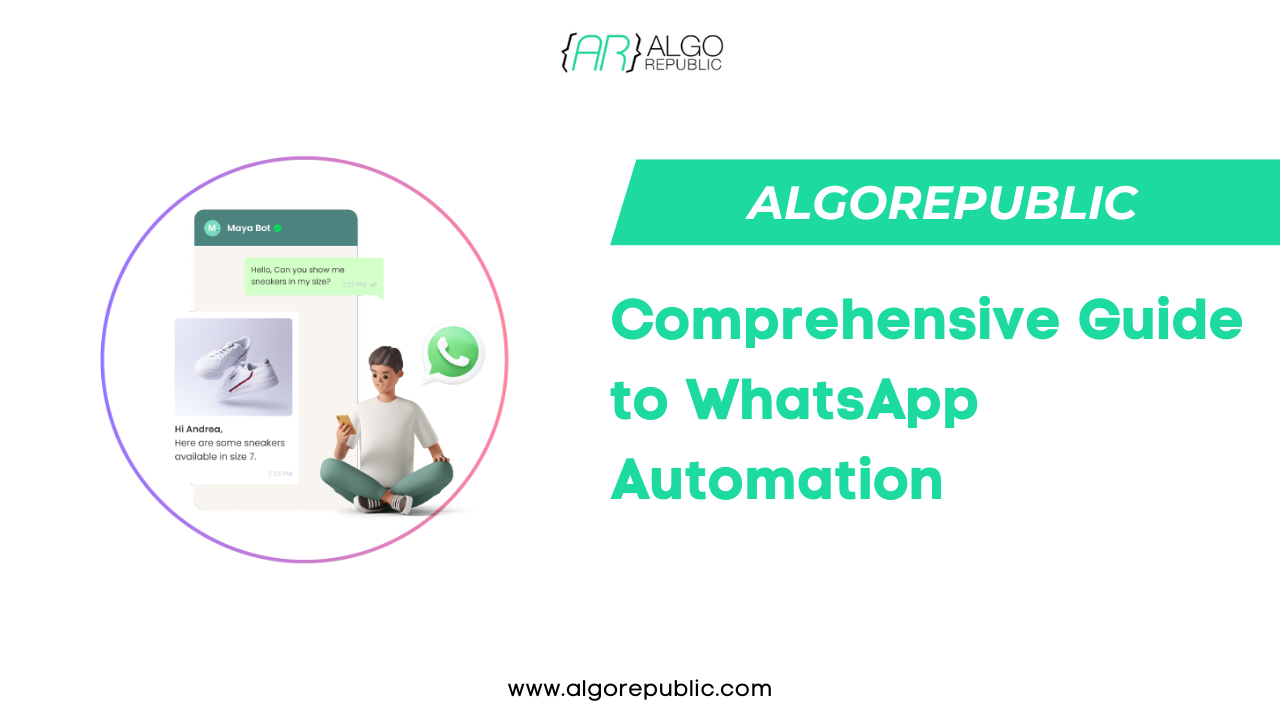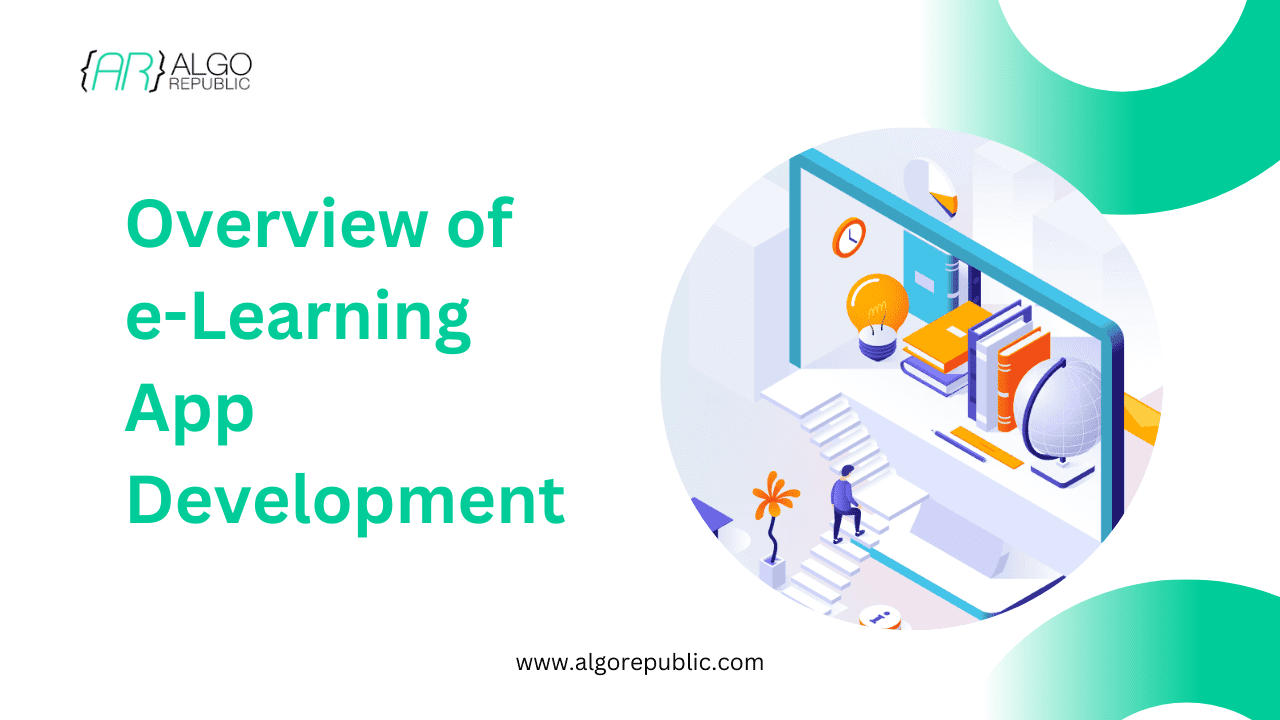Table of Contents
In the current fast-paced digital environment, successful business outcomes depend on effective communication. WhatsApp Automation is now identified as a significant platform that provides great customer accessibility and popularity enabling businesses to foster growth by engaging with their customers.
By automating interactions on this app, organizations can improve efficiency, streamline processes while offering customized experiences to multiple users. This guide explores automation in regard to WhatsApp alongside its associated benefits demonstrated through versatile use cases. Furthermore, accompanied by a clear guide for businesses seeking to automate messages using both WhatsApp Business App & API tools.
An intro to WhatsApp Automation
Automated tools and technologies are employed in WhatsApp automation to send messages, replies, and notifications without manual intervention. This involves scheduling messages, setting up chatbots, as well as managing customer interactions effortlessly. By automating minor tasks with these functionalities it enables businesses to save time while improving responsiveness that will enhance overall communication efficiency on the messaging platform of WhatsApp.
Advantages of WhatsApp Automation
Maximum effectiveness
By streamlining communication processes, WhatsApp automation helps businesses to communicate with numerous recipients at the same time and manage customer inquiries more effectively. It removes the need for manual intervention, thus cutting down response durations and boosting productivity on an overall basis.
24/7 Available
Through the implementation of automation, businesses can assure uninterrupted accessibility and rapid reply to customer inquiries regardless of their time zone or hours in operation. In doing so, they ensure a smooth and effortless encounter for clients which leads to greater contentment levels.
Personalization
Businesses can use business automation tools to send personalized messages by analyzing customer preferences, purchase history and interaction patterns. Customizing the message content enhances communication between businesses and customers resulting in strengthened relationships and increased engagement.
Scalability
The capacity of a system or process to manage growth and heightened demand is known as scalability. Through automation, scaling up becomes possible for businesses while still maintaining quality service delivery and responsiveness in dealing with customer interactions on an extensive scale. This adaptability factor in the face of increasing organizational progress enables firms to adjust effortlessly towards meeting rising demands without sacrificing reliability standards during service provision.
Cost saving
Businesses can achieve cost savings and allocate more resources towards strategic initiatives and value-added activities by automating repetitive tasks. Automation reduces the needs for manual involvement, enabling operation efficiencies in the long term that result in reduced costs.
7 Examples of WhatsApp Automation
1. Customer Support Automation:
A customer sends a message inquiring about a product. An automated chatbot responds instantly, providing information about the product, its availability, pricing, and additional details like shipping options or return policies. If the query is complex, the chatbot escalates it to a human agent for further assistance. The human agent can then seamlessly take over the conversation, ensuring a smooth transition and resolving the customer’s issue effectively.
2. Appointment Reminders:
A service-based business utilizes WhatsApp automation to send automated appointment reminders to clients scheduled for appointments. These reminders are personalized with the client’s name, appointment date, time, location, and any preparatory instructions. The automated messages are sent at strategic intervals before the appointment, ensuring that clients are well-informed and prepared. By reducing the likelihood of no-shows, the business improves scheduling efficiency and maximizes appointment bookings.
3. Order Updates:
An e-commerce platform leverages WhatsApp automation to send automated notifications to customers at different stages of their order processing. Upon order confirmation, customers receive an automated message with their order details and an estimated delivery date. As the order progresses, automated updates are sent regarding order processing, shipment tracking, and delivery confirmation. These real-time updates keep customers informed and engaged throughout the order fulfillment process, enhancing transparency and reducing customer inquiries.
4. Marketing Campaigns:
A retail company segments its customer base and implements WhatsApp automation to run targeted marketing campaigns. Using customer data and purchase history, the company sends personalized promotions, discounts, and product recommendations to segmented customer groups. These automated messages are tailored to each customer’s preferences and buying behavior, resulting in higher engagement and conversion rates. By automating the delivery of marketing messages, the company optimizes its marketing efforts and maximizes ROI.
5. Feedback Collection:
A service provider integrates WhatsApp automation into its feedback collection process to gather valuable insights from customers. After service delivery, customers receive automated feedback forms via WhatsApp, prompting them to rate their experience and provide feedback. The automated forms are designed to be user-friendly and easily accessible, encouraging higher response rates. The collected feedback is then analyzed to identify areas for improvement and enhance the overall customer experience. By automating feedback collection, the service provider gains valuable insights that drive continuous improvement and customer satisfaction.
6. Event Reminders:
An event organizer uses WhatsApp automation to send automated reminders and updates to registered attendees of an upcoming event. These automated messages include event details such as date, time, venue, agenda, and any last-minute changes or updates. By keeping attendees informed and engaged, the organizer ensures a smooth event experience and minimizes the risk of confusion or missed opportunities. Automated event reminders help boost attendance rates and enhance attendee satisfaction, ultimately contributing to the success of the event.
7. Subscription Renewal Notifications:
A subscription-based service provider implements WhatsApp automation to send renewal notifications to subscribers whose subscriptions are about to expire. Automated messages are sent a few days before the subscription renewal date, reminding subscribers to renew their subscriptions to continue enjoying the service. The messages include renewal options, payment links, and instructions for seamless renewal. By automating subscription renewal notifications, the service provider reduces churn, improves retention rates, and maintains a steady stream of recurring revenue.
Ways to utilize WhatsApp Automation
Customer Support:
By using automated chatbots, routine customer inquiries can be efficiently handled with immediate responses. If there are complex issues beyond the artificial intelligence’s capacity to resolve or comprehend, it will quickly escalate them to human agents who have expertise in that area. This efficient approach results in faster response times and greater client satisfaction while keeping support expenditures under control.
Reminders for Appointments:
To enhance scheduling productivity and minimize no-shows, businesses may computerized reminders, confirmations as well as updates for appointments. Sending automatic notifications guarantees that consumers are notified beforehand leading to seamless appointment encounters.
Updates on Your Order:
Real-time notifications can provide customers with updates on the progress of their orders, shipping information, and delivery status. By doing so, it helps reduce customer inquiries while minimizing uncertainties during the order fulfillment process which elevates transparency levels.
Advertising Strategies:
By utilizing automation, businesses are capable of sending specified marketing messages, promotions and suggestions for products to segmented customer groups. The streamlined campaigns empower businesses in using quality content at an appropriate time resulting in higher engagement levels and increased sales
Collecting feedback:
Customers can receive automated surveys and feedback forms to provide valuable insights, measure satisfaction levels, and pinpoint potential areas for improvement. This information allows businesses to make informed decisions based on data analysis, improve their products or services, and elevate the customer experience holistically.
WhatsApp Automation messages – A Quick Guide
The WhatsApp Business application
With the WhatsApp automation App, businesses can access basic automation features such as quick responses, away messages and tags to efficiently sort out and direct customer chats. These integrated utilities enable businesses to automate replies, extend greetings and offer immediate help while interacting with clients.
The API for WhatsApp Automation
Businesses seeking more advanced automation features can use the WhatsApp Business API. This program provides programmable access to WhatsApp’s messaging capabilities and enables businesses to develop customized chatbots, automate message dispatching, and seamlessly incorporate WhatsApp into their current CRM systems and business applications.
Future Trends in WhatsApp Automation
As technology continues to evolve, the future of WhatsApp automation is set to bring even more advanced features and capabilities that will transform how businesses interact with their customers. Here are some key trends to watch:
Enhanced AI and Machine Learning Integration
The integration of artificial intelligence (AI) and machine learning (ML) with WhatsApp automation will become increasingly sophisticated. These technologies will enable more natural and intuitive interactions between businesses and customers. AI-powered chatbots will be able to understand and respond to complex queries with greater accuracy, predict customer needs, and offer personalized recommendations in real time.
Advanced Natural Language Processing (NLP)
Natural Language Processing (NLP) advancements will allow chatbots to better understand the nuances of human language, including slang, idioms, and regional dialects. This will improve the quality of automated interactions, making them more human-like and enhancing the overall customer experience.
Omnichannel Integration
Future WhatsApp automation solutions will likely offer seamless integration with other communication channels such as email, SMS, social media, and voice assistants. This omnichannel approach will provide customers with a consistent and unified experience, regardless of how they choose to interact with a business.
Predictive Analytics
Predictive analytics will play a significant role in WhatsApp automation, enabling businesses to anticipate customer needs and behaviors. By analyzing historical data and customer interactions, businesses can predict future trends, optimize their marketing strategies, and deliver proactive customer support.
Hyper-Personalization
Automation tools will leverage big data and AI to offer hyper-personalized experiences. By analyzing individual customer preferences, purchase history, and interaction patterns, businesses will be able to tailor their messages and offers to each customer, significantly improving engagement and conversion rates.
Increased Security and Compliance
As data privacy regulations become stricter, future WhatsApp automation solutions will prioritize security and compliance. Enhanced encryption methods, robust data protection measures, and compliance with international standards such as GDPR will be essential to maintain customer trust and protect sensitive information.
Voice-Activated Chatbots
With the growing popularity of voice assistants like Alexa and Google Assistant, voice-activated chatbots will become a prominent feature in WhatsApp automation. Customers will be able to interact with businesses using voice commands, making the communication process more convenient and accessible.
Enhanced Analytics and Reporting
Future trends will also focus on providing businesses with advanced analytics and reporting tools. These tools will offer deeper insights into customer interactions, chatbot performance, and overall engagement metrics, enabling businesses to fine-tune their strategies and optimize their automation workflows.
Integration with IoT Devices
The integration of WhatsApp automation with Internet of Things (IoT) devices will open up new possibilities for customer interactions. For example, automated messages could be triggered by IoT sensors, providing real-time updates and support for smart home devices, wearables, and other connected gadgets.
Collaborative AI Models
Collaborative AI models, where AI systems work together and learn from each other, will enhance the capabilities of WhatsApp automation. This collaborative approach will lead to more efficient problem-solving, faster response times, and improved customer satisfaction.
FAQs and Troubleshooting Tips
What is WhatsApp Automation?
WhatsApp Automation refers to the use of automated tools and technologies to manage interactions on WhatsApp. This includes sending messages, responding to customer inquiries, scheduling notifications, and handling various communication tasks without manual intervention.
How can businesses benefit from WhatsApp Automation?
Businesses can benefit from WhatsApp Automation by improving efficiency, reducing response times, enhancing customer satisfaction, providing 24/7 support, and personalizing customer interactions. Automation also allows businesses to scale their communication efforts seamlessly.
What are the key features of WhatsApp Business API?
The WhatsApp Business API provides advanced automation features such as programmable messaging, chatbot integration, customer support automation, message templates, and analytics tools. It allows businesses to integrate WhatsApp with their existing CRM and business systems.
Is WhatsApp Automation secure?
Yes, WhatsApp Automation is secure. WhatsApp uses end-to-end encryption to protect messages. However, businesses must ensure they comply with data privacy regulations and implement robust security measures to protect customer information.
Can I personalize automated messages?
Absolutely. WhatsApp Automation tools often include features for personalizing messages based on customer data, such as purchase history, preferences, and previous interactions. This helps in delivering a more tailored and engaging customer experience.
How do I get started with WhatsApp Automation?
To get started, you can use the WhatsApp Business App for basic automation features or opt for the WhatsApp Business API for more advanced functionalities. Define your automation goals, choose the right tools, and set up your workflows to begin automating your communication processes.
Troubleshooting Tips
Automation Not Triggering Properly
Check Automation Settings: Ensure that your automation triggers and conditions are correctly configured.
Verify Permissions: Ensure that the WhatsApp Business App or API has the necessary permissions to execute automated tasks.
Review Logs: Check the logs for any error messages or issues that might indicate what’s going wrong.
Messages Not Sending
Network Issues: Verify that your internet connection is stable.
Service Status: Check if WhatsApp’s service is experiencing downtime.
API Limits: Ensure you are not exceeding the messaging limits imposed by the WhatsApp Business API.
Responses Are Delayed
Server Load: High server load can cause delays. Optimize your server resources to handle the load efficiently.
Optimize Workflows: Review and streamline your automated workflows to reduce processing time.
Chatbot Not Understanding Queries
Training Data: Make sure your chatbot is trained with a comprehensive dataset to handle a variety of queries.
NLP Tuning: Fine-tune the Natural Language Processing (NLP) settings to improve accuracy.
Regular Updates: Continuously update and improve your chatbot based on user interactions and feedback.
Data Privacy Concerns
Compliance Check: Regularly review your processes to ensure compliance with data protection regulations like GDPR.
Encryption: Use end-to-end encryption for all automated communications.
User Consent: Obtain explicit consent from users before sending automated messages or storing their data.
Integration Issues
API Documentation: Refer to the WhatsApp Business API documentation to ensure correct integration.
Compatibility Check: Ensure that your existing systems are compatible with WhatsApp API.
Technical Support: Seek help from technical support or a developer if integration issues persist.
To sum up, the use of WhatsApp automation offers a good chance for companies to upgrade their communication, streamline operations and provide exceptional customer service. With access to automated tools like the WhatsApp Business App or API, businesses can open new avenues leading towards growth while boosting productivity levels in today’s competitive environment. In conclusion, adopting automation technology isn’t just trendy but crucially strategic for any company seeking success in our contemporary digital age.



